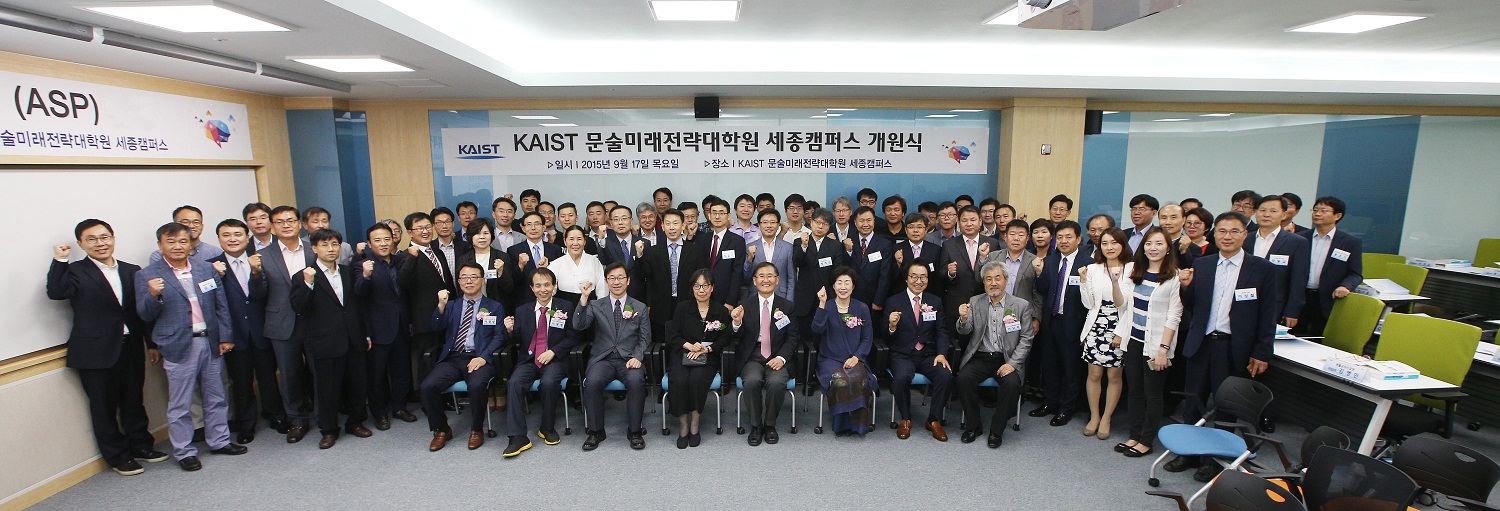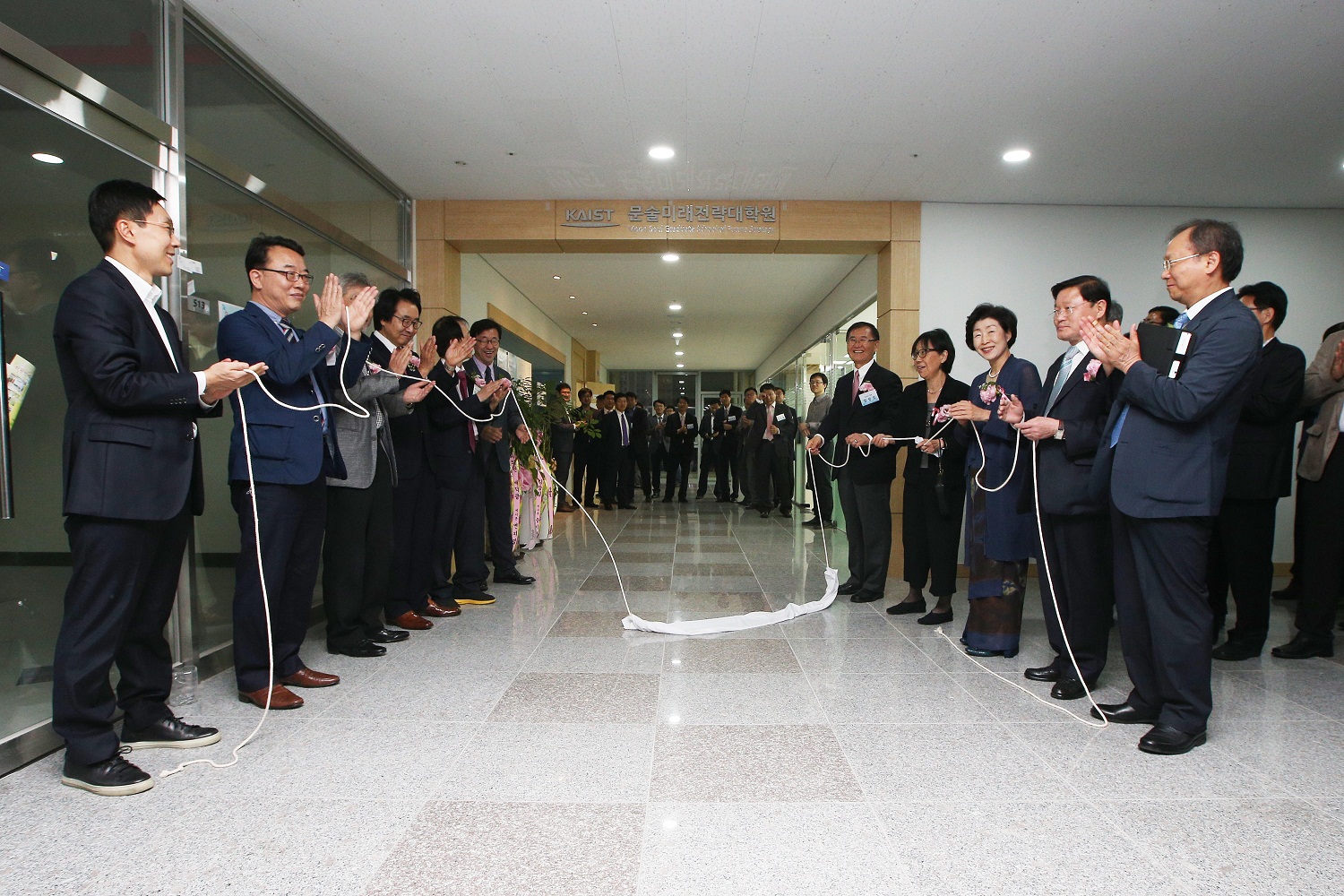event
Open forums for envisioning the next 30 years for Korea from the perspective of young people will be held in five metropolitan cities in Korea. Organized by KAIST and hosted by the Ministry of Science, ICT and Future Planning and the Committee for the 70th Anniversary of Korean Liberation, the Next Generation Open Forum 2045 invites young people to shape the future image of Korea for the upcoming 100th anniversary of Korean liberation. It will start off with its first event on September 22 in the Millennium Hall of Konkuk University in Seoul.
In this event, a panel and invited guests will discuss employment issues with a view to ameliorating problems prevalent in the society. A robotics scientist, Dr. JK Han will address the impact of robot automation on the job issue as a keynote speaker, and a performance featuring human-size robot actor will follow his talk to celebrate the opening of the event.
Invited guests can actively participate in the discussion by suggesting their opinions on job issue of the future and by voting on their smartphone apps during the event. Every opinion conveyed during the discussion will be printed and put in a time capsule, which will be opened in 2045 for the celebration of 100th anniversary of Korean liberation.
The Moon Soul Graduate School of Future Strategy of KAIST will organize events in five cities including Daegu, Daejeon, Busan, and Gwangju with topics including education, science and technology, unification diplomacy, and culture. The event will end with a symposium held in Seoul. Perspective applicants can apply for free to the Next Generation Open Forum 2045 on the official website of the Committee for the 70th Anniversary of Korean Liberation.


-
research KAIST Develops World’s First Wireless OLED Contact Lens for Retinal Diagnostics
<ID-style photograph against a laboratory background featuring an OLED contact lens sample (center), flanked by the principal authors (left: Professor Seunghyup Yoo ; right: Dr. Jee Hoon Sim). Above them (from top to bottom) are: Professor Se Joon Woo, Professor Sei Kwang Hahn, Dr. Su-Bon Kim, and Dr. Hyeonwook Chae> Electroretinography (ERG) is an ophthalmic diagnostic method used to determine whether the retina is functioning normally. It is widely employed for diagnosing hereditary
2025-08-12 -
research KAIST Develops AI That Automatically Designs Optimal Drug Candidates for Cancer-Targeting Mutations
< (From left) Ph.D candidate Wonho Zhung, Ph.D cadidate Joongwon Lee , Prof. Woo Young Kim , Ph.D candidate Jisu Seo > Traditional drug development methods involve identifying a target protin (e.g., a cancer cell receptor) that causes disease, and then searching through countless molecular candidates (potential drugs) that could bind to that protein and block its function. This process is costly, time-consuming, and has a low success rate. KAIST researchers have developed an AI model th
2025-08-12 -
event 2025 APEC Youth STEM Science Exchange Program Successfully Completed
<Photo1. Group photo at the end of the program> KAIST (President Kwang Hyung Lee) announced on the 11thof August that it successfully hosted the 'APEC Youth STEM Conference KAIST Academic Program,' a global science exchange program for 28 youth researchers from 10 countries and over 30 experts who participated in the '2025 APEC Youth STEM* Collaborative Research and Competition.' The event was held at the main campus in Daejeon on Saturday, August 9. STEM (Science, Technology, Eng
2025-08-11 -
event 'Team Atlanta', in which KAIST Professor Insu Yun research team participated, won the DARPA AI Cyber Challenge in the US, with a prize of 5.5 billion KRW
<Photo1. Group Photo of Team Atlanta> Team Atlanta, led by Professor Insu Yun of the Department of Electrical and Electronic Engineering at KAIST and Tae-soo Kim, an executive from Samsung Research, along with researchers from POSTECH and Georgia Tech, won the final championship at the AI Cyber Challenge (AIxCC) hosted by the Defense Advanced Research Projects Agency (DARPA). The final was held at the world's largest hacking conference, DEF CON 33, in Las Vegas on August 8 (local time)
2025-08-10 -
event Prof. Seungbum Koo’s Team Receives Clinical Biomechanics Award at the 30th International Society of Biomechanics Conference
<(From Left) Ph.D candidate Jeongseok Oh from KAIST, Dr. Seungwoo Yoon from KAIST, Prof.Joon-Ho Wang from Samsung Medical Center, Prof.Seungbum Koo from KAIST> Professor Seungbum Koo’s research team received the Clinical Biomechanics Award at the 30th International Society of Biomechanics (ISB) Conference, held in July 2025 in Stockholm, Sweden. The Plenary Lecture was delivered by first author and Ph.D. candidate Jeongseok Oh. This research was conducted in collaboration with P
2025-08-10